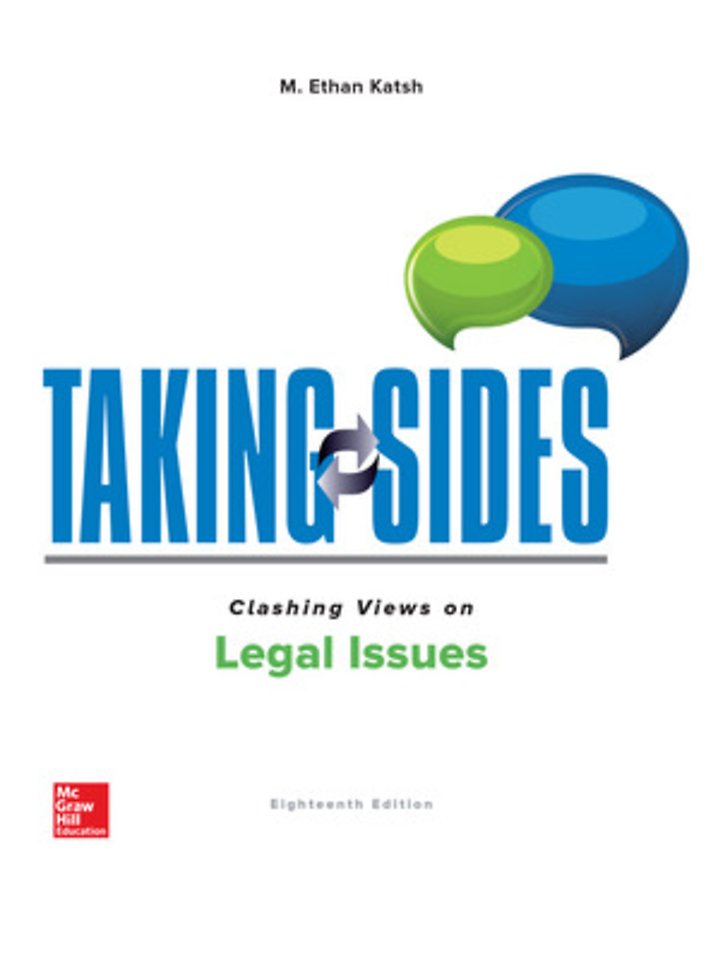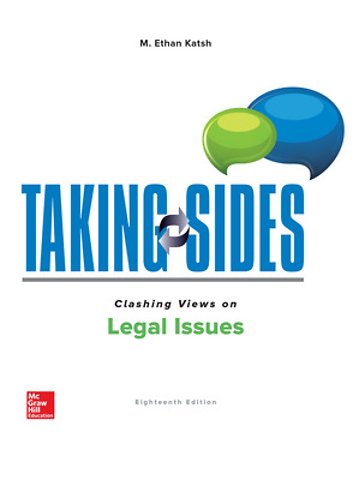Taking Sides: Clashing Views on Legal Issues
Samenvatting
The Taking Sides Collection on McGraw-Hill Create® includes current controversial issues in a debate-style forma designed to stimulate student interest and develop critical thinking skills. This Collection contains a multitude of current and classic issues to enhance and customize your course. You can browse the entire Taking Sides Collection on Create or you can search by topic, author, or keywords. Each Taking Sides issue is thoughtfully framed with Learning Outcomes, an Issue Summary, an Introduction, and an "Exploring the Issue" section featuring Critical Thinking and Reflection, Is There Common Ground?, Additional Resources, and Internet References. Go to the Taking Sides Collection on McGraw-Hill Create® at www.mcgrawhillcreate.com/takingsides and click on "Explore this Collection" to browse the entire Collection. Select individual Taking Sides issues to enhance your course, or access and select the entire Katsh, Taking Sides: Clashing Views on Legal Issues, 18/e book here http://create.mheducation.com/createonline/index.html#qlink=search%2Ftext%3Disbn:125988368X for an easy, pre-built teaching resource. Visit http://create.mheducation.com for more information on other McGraw-Hill titles and special collections.
Specificaties
Inhoudsopgave
v. Jardines," United States Supreme Court (2013)<br></span><span>No: Samuel Anthony Alito, Jr., from "Dissenting Opinion, Florida v. Jardines," United States Supreme Court (2013)</span></p><p>Supreme Court Justice Antonin Scalia finds that it is a search and a violation of the Fourth Amendment when police obtain evidence by allowing a trained dog to physically enter and occupy an area outside a home in which permission has not been obtained from the home owner. Supreme Court Justice Samuel Alito disagrees that there was a trespass here or that the dog sniff could be considered an invasion of any reasonable expectation of privacy given that one can expect that odors will float outside of a house.</p><p><br></p><p><u>Issue: Does the “Cruel and Unusual Punishment” Clause of the Eighth Amendment Bar the Imposition of the Death Penalty on Juveniles?</u></p><p>Yes: Anthony Kennedy, from "Majority Opinion, Donald P. Roper, Superintendent, Potosi Correctional Center, Petitioner v. Christopher Simmons," United States Supreme Court (2005)<br><span>No: Antonin Scalia, from "Minority Opinion, Donald P. Roper, Superintendent, Potosi Correctional Center, Petitioner v. Christopher Simmons," United States Supreme Court (2005)</span></p><p>Supreme Court Justice Anthony Kennedy holds that the Constitution prohibits the execution of a person who was under the age of 18 at the time of the offense. Supreme Court Justice Antonin Scalia believes that the Constitution does not preclude the execution of a juvenile.</p><p><br></p><p><u>Issue: Does the Definition of “Sex” in Title IX Include Gender Identity and Allow Transgender Students to Use the Restrooms That Align with Their Gender Identities and Not Their Biological Sex?</u></p><p>Yes: Henry Franklin Floyd, from "Majority Opinion, G.G. v. Gloucester County School Board," United States Court of Appeals for the Fourth Circuit (2016)<br><span>No: Counsel for Amici Curiae, from "Amicus Brief of Christian Educators Association International, Gloucester County School Board v. G.G.," United States Supreme Court (2017)</span></p><p>Circuit Judge Henry Franklin Floyd held that the term “sex” was ambiguous and that it must include gender identity and not just biological sex. The Christian Educators Association International argues that the term “sex” is unambiguous, and subject to one interpretation, that of biological sex.</p><p><br></p><p><u>Issue: Does a Facebook Poster Need More Than “General Intent” for a Post to Be Considered a “True Threat” Under Criminal Law?</u></p><p>Yes: John G. Roberts, Jr., from "Majority Opinion, Elonis v. United States," United States Supreme Court (2015)<br><span>No: Samuel Anthony Alito, Jr., from "Dissenting Opinion, Elonis v. United States," United States Supreme Court (2015)</span></p><p>Supreme Court Chief Justice John Roberts holds that more than a “general intent,” standard is required to hold a Facebook poster criminally liable for the contents of the post. Supreme Court Justice Samuel Alito argues that the majority is unclear as to the state of mind necessary for someone posting a threat on Facebook to be criminally liable for a “true threat.”</p><p>Unit 4: Law and the Community</p><p><u>Issue: Is There a Constitutional Right to Possess a Firearm for Private Use?</u></p><p>Yes: Antonin Scalia, from "Majority Opinion, District of Columbia, et al., v. Heller," United States Supreme Court (2008)<br><span>No: John Paul Stevens, from "Dissenting Opinion, District of Columbia, et al., v. Heller," United States Supreme Court (2008)</span></p><p>Supreme Court Justice Antonin Scalia argues that the Second Amendment protects the right of a private citizen to own a handgun for self-defense. Supreme Court Justice John Paul Stevens argues that a previous case, United States v. Miller, held that the Second Amendment did not protect the right of a private citizen to own a handgun for self-defense.</p><p><br></p><p><u>Issue: Are Blanket Prohibitions on Cross Burnings Unconstitutional?</u></p><p>Yes: Sandra Day O'Connor, from "Plurality Opinion, Virginia v. Black," United States Supreme Court (2003)<br><span>No: Clarence Thomas, from "Dissenting Opinion, Virginia v. Black," United States Supreme Court (2003)</span></p><p>Supreme Court Justice Sandra Day O’Connor argues that part of a Virginia statute proscribing cross burning with the intent to intimidate is constitutional because it is content discrimination based on the very reasons that make it constitutional; however, part of the statute is unconstitutional insofar as it requires an inference of intent to intimidate solely based on the action of cross burning itself, which is symbolic speech. Supreme Court Justice Clarence Thomas disagrees with part of the statute being held unconstitutional, arguing that the history and nature of cross burning in the United States inextricably links the act to threatening and menacing violence and that the intent to intimidate can therefore be inferred solely from the act of cross burning itself.</p><p><br></p><p><u>Issue: Does the Fourth Amendment Prohibit the Police from Collecting a DNA Sample from a Person Arrested, but Not Yet Convicted on Felony Charges?</u></p><p>Yes: Anthony Kennedy, from "Majority Opinion, Maryland v. King," United States Supreme Court (2013)<br><span>No: Antonin Scalia, from "Dissenting Opinion, Maryland v. King," United States Supreme Court (2013)</span></p><p>Justice Anthony Kennedy rules that using a cheek swab to collect a person’s DNA during post-arrest processing is a reasonable search under the Fourth Amendment because it is predominantly used to confirm the identity of the arrestee. Justice Antonin Scalia argues that DNA collection at the time of arrest is an unreasonable search because the arrestee’s DNA profile is predominantly used to investigate unrelated crimes.</p><p><br></p><p><u>Issue: Is Same-sex Marriage Protected by the Fourteenth Amendment to the U.S. Constitution?</u></p><p><span>Yes: Anthony Kennedy, from "Majority Opinion, Obergefell v. Hodges," United States Supreme Court (2015)<br></span><span>No: John G. Roberts, Jr, from "Dissenting Opinion, Obergefell v. Hodges," United States Supreme Court (2015)</span></p><p><span>Supreme Court Justice Anthony Kennedy holds that marriage is a fundamental right, and bans on same-sex marriage are unconstitutional under the Due Process and Equal Protection Clauses of the Fourteenth Amendment. Supreme Court Chief Justice John Roberts argues that it is no place for the Court, as unelected lawyers, to make the determination of what defines “marriage,” as that is the job of the legislature and not the judiciary.</span></p><p><br></p><p><u>Issue: Are Race-conscious Public University Admissions Policies Permitted Under the Fourteenth Amendment?</u></p><p>Yes: Anthony Kennedy, from "Majority Opinion, Fisher v. University of Texas at Austin II," United States Supreme Court (2016)<br><span>No: Samuel Anthony Alito, Jr., from "Dissenting Opinion, Fisher v. University of Texas at Austin II," United States Supreme Court (2016)</span></p><p><span>Justice Anthony Kennedy holds that the race-conscious admissions program in use at the University of Texas does not violate the Equal Protection Clause of the Fourteenth Amendment. Justice Samuel Alito argues that the university failed to effectively demonstrate that its admission policy needs a racial element and that the one it employs does, in fact, foster diversity.</span></p><p><br></p><p><u>Issue: Is It Unconstitutional for States to Imprison Undocumented Immigrants?</u></p><p>Yes: Anthony Kennedy, from "Opinion of the Court, Arizona v. United States," United States Supreme Court (2012)<br><span>No: Antonin Scalia, from "Dissenting Opinion, Arizona v. United States," United States Supreme Court (2012)</span></p><p><span>Justice Anthony Kennedy argues that a recent state law making it a crime to be an undocumented immigrant in Arizona impinges on the U.S. federal government’s authority to regulate immigration. Justice Antonin Scalia argues that it is not unconstitutional for a state to supplement U.S. federal immigration law with its own, harsher penalties for illegal immigration.</span></p><br><br/>
Net verschenen
Rubrieken
- aanbestedingsrecht
- aansprakelijkheids- en verzekeringsrecht
- accountancy
- algemeen juridisch
- arbeidsrecht
- bank- en effectenrecht
- bestuursrecht
- bouwrecht
- burgerlijk recht en procesrecht
- europees-internationaal recht
- fiscaal recht
- gezondheidsrecht
- insolventierecht
- intellectuele eigendom en ict-recht
- management
- mens en maatschappij
- milieu- en omgevingsrecht
- notarieel recht
- ondernemingsrecht
- pensioenrecht
- personen- en familierecht
- sociale zekerheidsrecht
- staatsrecht
- strafrecht en criminologie
- vastgoed- en huurrecht
- vreemdelingenrecht

